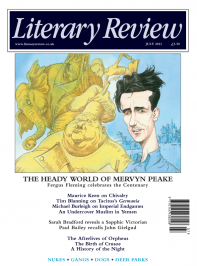Peter Marshall
When Darkness Falls
Evening’s Empire: A History of the Night in Early Modern Europe
By Craig Koslofsky
Cambridge University Press 431pp £18.99
This is an ambitious book, and not one for the dilettantish reader. Craig Koslofsky sees ‘the night’, not so much as a discrete object of historical study in its own right, but as a mechanism for exploring (one is tempted to say, shedding light on) a range of important themes in the social, cultural and political history of early modern Europe. Its scope, as the author informs us at the outset, covers the reciprocal relationships between night and ‘witchcraft persecutions, confessional formation, absolutism and court culture, the civilizing process, social discipline, gender and the public sphere, and colonization, race, and the early Enlightenment’. To which one can only add, wow. The central idea in the book is the concept of ‘nocturnalization’, defined here as ‘the ongoing expansion of the legitimate social and symbolic uses of the night’.
Night-time is a compelling subject for the historian because it is both an inescapable facet of common experience (something connecting us to our ancestors) and also a resonant source of metaphor and meaning (something that often emphasises our differences from them). Koslofsky, a distinguished historian of Reformation-era Germany,

Sign Up to our newsletter
Receive free articles, highlights from the archive, news, details of prizes, and much more.@Lit_Review
Follow Literary Review on Twitter
Twitter Feed
Though Jean-Michel Basquiat was a sensation in his lifetime, it was thirty years after his death that one of his pieces fetched a record price of $110.5 million.
Stephen Smith explores the artist's starry afterlife.
Stephen Smith - Paint Fast, Die Young
Stephen Smith: Paint Fast, Die Young - Jean-Michel Basquiat: The Making of an Icon by Doug Woodham
literaryreview.co.uk
15th-century news transmission was a slow business, reliant on horses and ships. As the centuries passed, though, mass newspapers and faster transport sped things up.
John Adamson examines how this evolution changed Europe.
John Adamson - Hold the Front Page
John Adamson: Hold the Front Page - The Great Exchange: Making the News in Early Modern Europe by Joad Raymond Wren
literaryreview.co.uk
"Every page of "Killing the Dead" bursts with fresh insights and deliciously gory details. And, like all the best vampires, it’ll come back to haunt you long after you think you’re done."
✍️My review of John Blair's new book for @Lit_Review
Alexander Lee - Dead Men Walking
Alexander Lee: Dead Men Walking - Killing the Dead: Vampire Epidemics from Mesopotamia to the New World by John Blair
literaryreview.co.uk